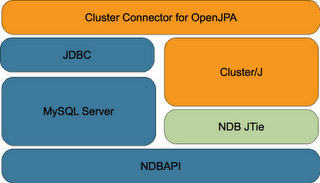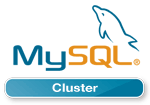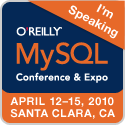
ClusterJ Architecture
MySQL have been working on a new way of accessing MySQL Cluster using Java. Designed for Java developers, the MySQL Cluster Connector for Java implements an easy-to-use and high performance native Java interface and OpenJPA plug-in that maps Java classes to tables stored in the high availability, real-time MySQL Cluster database.
There is a series of 2 webinars coming up, as always these are free to attend – you just need to register in advance:
Part 1: Tuesday, February 16, 2010: 10:00 Pacific time
- an overview of the MySQL Cluster Connector for Java
- what these technologies bring to Java developers
- implementation details of the MySQL Cluster Java API and Plug-In for OpenJPA
- configuring the connection to MySQL Cluster
- creating the Java Domain Object Model for your tables
- managing insert, update, and delete operations
- querying the database
- how to get started developing new Java applications using these interfaces
Tue, Feb 16: 08:00 Hawaii time
Tue, Feb 16: 11:00 Mountain time (America)
Tue, Feb 16: 12:00 Central time (America)
Tue, Feb 16: 13:00 Eastern time (America)
Tue, Feb 16: 18:00 UTC
Tue, Feb 16: 18:00 Western European time
Tue, Feb 16: 19:00 Central European time
Tue, Feb 16: 20:00 Eastern European time
Register for Part 1 here.
an overview of the MySQL Cluster Connector for Java
what these technologies bring to Java developers
implementation details of the MySQL Cluster Java API and Plug-In for OpenJPA
configuring the connection to MySQL Cluster
creating the Java Domain Object Model for your tables
managing insert, update, and delete operations
querying the database
how to get started developing new Java applications using these interfaces
Part 2: Wednesday, March 03, 2010: 10:00 Pacific time
- how MySQL Cluster Connector for Java coexists with existing OpenJPA / TopLink / JDBC-based apps
- how to evaluate the MySQL Cluster Connector for Java alternatives
- performance comparisons with both existing Java access and with native NDB API access to MySQL Cluster
- what the future holds for this technology
Wed, Mar 03: 08:00 Hawaii time
Wed, Mar 03: 11:00 Mountain time (America)
Wed, Mar 03: 12:00 Central time (America)
Wed, Mar 03: 13:00 Eastern time (America)
Wed, Mar 03: 18:00 UTC
Wed, Mar 03: 18:00 Western European time
Wed, Mar 03: 19:00 Central European time
Wed, Mar 03: 20:00 Eastern European time
Register for Part 2 here.
This functionality isn’t yet GA but it is available for you to try and we’d love to get feedback (which you can provide through the MySQL Cluster forum or by emailing cluster@lists.mysql.com
If you want to see for yourself then take a look at the Blog entry from Bernhard Ocklin – the engineering manager responsible for this work.
 The binary version for MySQL Cluster 7.1.2a has now been made available at http://dev.mysql.com/downloads/cluster/ under the Development tab.
The binary version for MySQL Cluster 7.1.2a has now been made available at http://dev.mysql.com/downloads/cluster/ under the Development tab.

